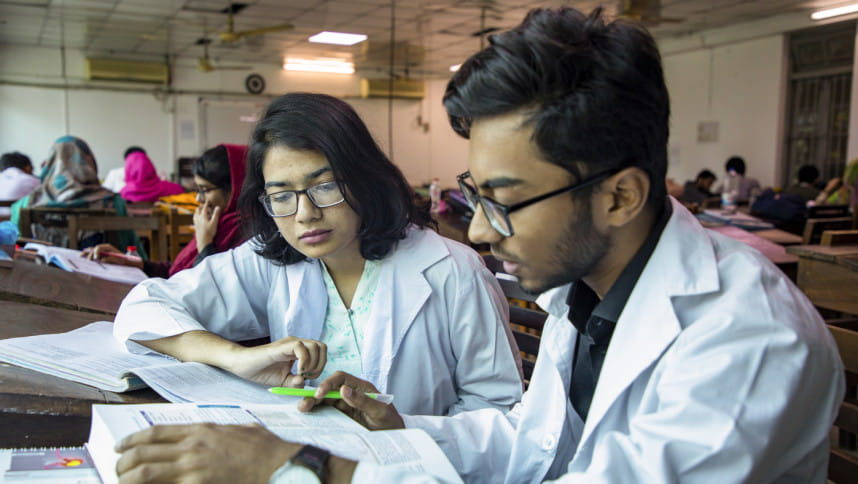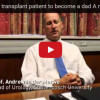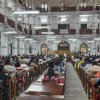Everything you need to know about the MBBS curriculum

Embarking on the path to becoming a doctor is a significant undertaking, and at the core of this academic journey lies the MBBS curriculum. It's a roadmap filled with diverse subjects, practical experiences, and clinical training, all crucial in shaping the aspirations of those destined to wear the white apron.
In Bangladesh, the pursuit of medical education involves a stringent admission process. Passing the medical college admission test is a prerequisite for securing a coveted spot in either a public or private medical college. In 2023, a total of 49,194 students (35.54 percent) passed the MBBS admission test. Candidates who ranked within the top 4000 or so earned the privilege of securing seats in esteemed public medical colleges.
The journey of a medical student is no easy feat, especially from the outset. Understanding the workings of the MBBS curriculum is crucial to help you discern whether it resonates with your aspirations and is the right fit for you.
The MBBS course spans five years, accompanied by a logbook-based rotatory internship lasting an additional year. These five years are organised into four academic phases: the first and fourth phases extend for one and a half years each, while the second and third phases last for one year each. Following the completion of each phase, medicos – medical practitioners or students – undertake professional examinations, marking crucial checkpoints in their academic progress.
The subjects studied in the first phase are Anatomy, Physiology, and Biochemistry. There are "items", which are viva-like exams on topics that collectively form a "card". A card is a written exam comprising all the topics covered in the items cleared by the students. Then, after two cards, a "term" takes place, which is a more comprehensive exam, including written, viva, practical, and OSPE (Objective Structured Practical Examination). In simple terms, items make up a card and cards (usually two) make up a term.
Following the culmination of three successive terms, indicating the completion of the syllabus for the aforementioned subjects, students undertake a pre-professional examination. This examination serves as a preparatory, mock assessment for the upcoming professional exam. Upon successfully passing the professional examination, students advance to the next phase of their academic journey.
Recent changes in the MBBS curriculum by the Bangladesh Medical and Dental Council (BMDC) have altered the subject lineup. In the second phase, where Forensic Medicine and Community Medicine were traditionally studied, the revised curriculum now includes Pharmacology and Forensic Medicine. Community Medicine has been moved to the third phase, where it is studied alongside subjects such as Pathology and Microbiology.
Following the first phase, cards typically no longer take place. Instead, the progression involves items, followed by terms (usually two), then the pre-professional examination and ultimately, the professional examination.
In the fourth or final phase, there are no items as well. However, "ward finals" are conducted based on ward placement. This practical examination includes a viva at the end. Subsequently, there is block posting, followed by the pre-professional examination and finally, the professional examination.
The subjects studied in the final phase are Medicine, Surgery, and lastly, Gynaecology and Obstetrics. Medicine encompasses Internal Medicine, Paediatrics, Psychiatry, Dermatology, Venereal Diseases, and Physical Medicine. Surgery covers General and Regional Surgery, Orthopaedics and Traumatology, Ophthalmology, Otorhinolaryngology, Anaesthesiology, Radiology, Radiotherapy, Blood Transfusion, and Dentistry. Gynaecology and Obstetrics include Neonatology and Family Planning.
This provides a comprehensive overview of the MBBS curriculum in our country. Opting for a career in medicine is a decision that warrants deliberate contemplation, demanding an introspective analysis of your driving motivations. Having a cause, often exceeding personal aspirations, serves as a fundamental source of resilience during the prolonged periods of strenuous physical and mental commitment demanded by this professional pathway.
Purna is a first year student at Shaheed M. Monsur Ali Medical College, Sirajganj.

 For all latest news, follow The Daily Star's Google News channel.
For all latest news, follow The Daily Star's Google News channel. 








Comments